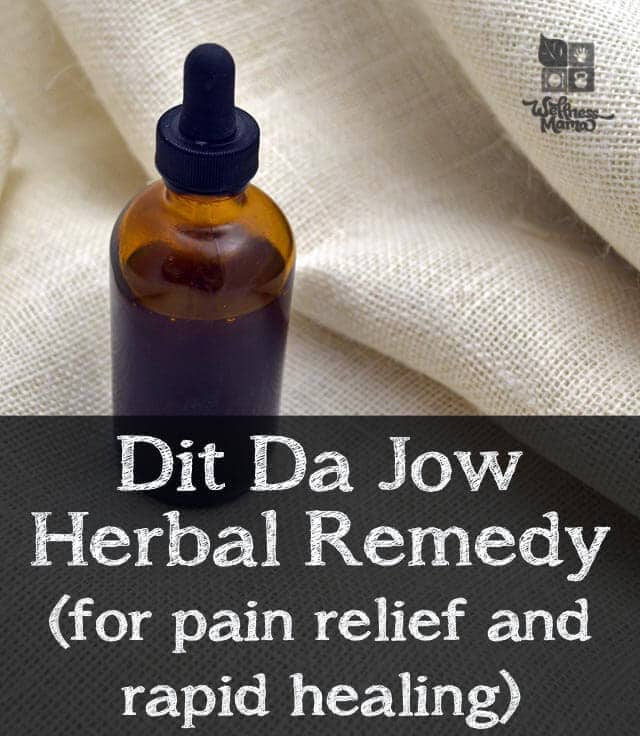Last year, our whole family started taking Jujutsu. We all enjoy it, but the rolls, throws and climbing aspects definitely come more easily to the kids! Any activity that involves wooden swords and rolling will inevitably create some bumps and bruises along the way.
After one class that left us particularly sore, the Sensei (teacher) shared a traditional herbal remedy that has been used in Asian countries for pain relief and rapid healing for years. It is called Dit Da Jow (literally translated “hit wine medicine”) and is essentially an herbal tincture that is packed with healing herbs. According to this article:
Dit Da Jow is an analgesic liniment traditionally preferred by martial artists. Often a martial arts master blends his unique mixture of many aromatic herbs such as myrrh and ginseng, which are combined to stimulate circulation, reduce pain and swelling, and improve healing of injuries and wounds. The tradition became known as “hit medicine”. Many people have also found this sort of liquid analgesic to be useful for reducing the aching of muscles, and arthritis and rheumatism discomfort.
I researched traditional Dit Da Jow recipes and while it was hard to find many of them (most are considered secret family recipes), I finally found a mixture that works really well for us. I used herbs that can be found in the US, so this wouldn’t be considered true Dit Da Jow, but it has been very effective for our bumps and bruises. It also helps speed recovery of non-martial arts related injuries so we keep it on hand. Store bought Dit Da Jow is available, though I haven’t tried it to know if it is as effective.
As with any herbs, vitamins or drugs, consult with a doctor before using, especially if you are pregnant or nursing. This recipe is for external use only. Any quality sourced organic/wild-crafted herbs will work. It is not inexpensive to make but it is very effective. I’ve seen it get rid of bruises and pain overnight.
Ingredients
- 1 tablespoon of dried Arnica flowers
- 1 tablespoon dried Plantain Leaf
- 1 tablespoon dried Comfrey Leaf
- 1 tablespoon Frankincense Powder
- 1 tablespoon dried Myrrh powder
- 1 tablespoon Fennel seeds
- 1 teaspoon dried Angelica Root
- 1 teaspoon dried Calendula Flowers
- 1 teaspoon dried Dandelion Root
- 1 teaspoon dried Horsetail
- 1 teaspoon dried Nettle Leaf
- 1 teaspoon cloves powder
- 1 teaspoon turmeric powder
Instructions
- Place all of the herbs in a glass mason jar (at least 16 ounces).
- Pour boiling water to just dampen all of the herbs. (This step is optional but helps to draw out the beneficial properties of the herbs)
- Fill the rest of the jar (or the entire jar if not using hot water too) with alcohol (drinkable, at least 80 proof) and stir with a clean spoon.
- Put the lid on the jar. Store the jar in a cool/dry place, shaking daily, for at least three weeks and up to six months. (I usually leave herbs for six weeks)
- Strain through cheesecloth and compost the herbs. Store the tincture in colored dropper bottles or clean glass jars.
- Use on skin as needed to help with bruises, sore muscles and pain. Do not use on cut or broken skin.
Do you make any herbal remedies? What is your favorite? Share below!


Leave a Reply